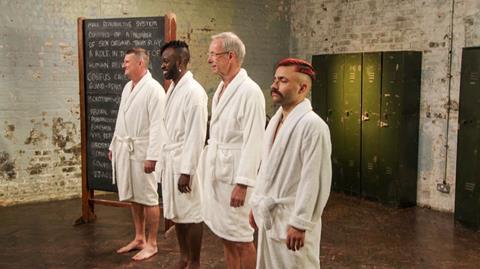Kate Orson is concerned that the new Channel 4 series is not ‘education’ at all

A new Channel 4 programme Naked Education features adults stripping naked in front of 14-16 year olds to help encourage body positivity. While many in the sex positive field are congratulating this open approach, there have also been over 1000 complaints to Offcom.
How should we as Christians respond?
The subject of nudity goes back, of course, to the garden of Eden, where Adam and Eve lived blissfully unaware of their nakedness until they ate from the tree of knowledge of good and evil. After that they sewed fig leaves together to make themselves clothes and when God banished them from the garden he made tunics to keep them warm. Nudity and bodies have been intertwined with shame ever since. One of the enemy’s tactics is to capitalise on the relationship we have with our bodies, creating a confusing mix of messages.
Children are exposed to perfect bodies on social media, and advertising and four in five UK teens have watched pornography by the time they are 16-17 (for more on that topic go here).. The programme’s intention is that it could help children to see real, imperfect bodies and realise there’s nothing wrong with body hair, or being a different shape or size.
However the show crosses a line, showing nudity to underage children*. It conditions the British population to think that this is all okay because it’s framed as education. While the show appears to promote ‘body positivity,’ like much in our culture, it is actually pushing confusing mixed messages that appear liberating on the surface but are actually harmful. A number of individuals in the show have been through trans surgery, and what could be more indicative of body hatred, than having major surgery to change their appearance?
Is showing the naked bodies of strangers to children an effective way to teach body positivity? There is no research to back up such an approach, and so it is experimental.
Before I came to faith…
It can be easy for supporters of the show to class anyone who objects to it as a ‘religious prude,’ but I speak from experience. A year before I became a Christian I trained as a sex coach, and one of the activities I took part in on my training was getting naked in front of my classmates to talk about my feelings about my body. I am fully in favour of helping people let go of negativity about their bodies, but now with hindsight as a Christian, I don’t think that getting naked is the best way to go about it.
The core issue with so much of our suffering, is that ever since the garden of Eden we’ve been separated from God, and orientated towards our selves. This hyper focus on the self is pushed everywhere, from social media, to the supposedly helpful ‘self-help’ industry. While some of what is promoted in the name of helping people is beneficial, there is no real escape from our own selves, and our issues, unless we fill the God-shaped hole within us.
It is disconnection that is the primary cause of suffering. Disconnection from our fellow humans and from God. The parent-child relationship can be seen as analogous to our relationship with our creator. Our children need that connection with us to thrive, just as we all need to connect with God. If children are dealing with body confidence issues, what they need is a safe space, to be able to open up, to share with other adults.
’Unannounced special times’
One of the things I always recommend to parents of older children is something called, ‘unannounced special time.’ It’s where we set an intention to take time to be with our children in their world, without judgment or our own agenda. So we might hang out with a teen while they play their favourite computer game, watching a TV programme, or trying on make up together, whatever they choose to do. Grabbing these opportunities when they do spring up can be an antidote to the closed bedroom doors, and separation that occurs when teens spend more time with their peers or focused on homework and afterschool activities.
When we spend time with our children, just listening, allowing them to direct the activities, it builds a sense of trust, and connection. We may find that after spending 1-1 time with our teens they sense our emotional availability, and open up about struggles they are facing. They might confide in us about how they feel about their body or relationships. They might feel more comfortable to cry and express feelings about a difficulty. Perhaps they’ve been traumatised by seeing porn, or confused about body hair, and why their body doesn’t look like the ones they see in their Instagram feed?
It’s in these moments that we can help to correct any misunderstandings they have. It’s connection and the space to process feelings that is ultimately healing. There’s no need for in-person nudity and the power balance of a TV company deciding that children need to see naked adults to ‘fix’ them is all wrong. What is really empowering is when a child takes the lead to choose a moment to ask a question, or express feelings. Our job as adults is to offer that space, without an agenda.
Focus on Christ
As Christian parents, we can also encourage our children to stay focused on Christ. God created our beautiful bodies and they are good. Yet the fall happened, and we can’t bypass it by stripping naked in public and finding worldly solutions to feel better about ourselves. We need Jesus to find healing through prayer, worship, and Christian community. The story of Oli London, who identified as trans and Korean, but detransitioned after joining a church shows that the ultimate route to peace is through Jesus.
I believe that if we have any hang-ups about our bodies, then we need to find a way to let go of them so we can set a good example to our children, and be there for their struggles. Maybe churches haven’t always done a good job at instilling body confidence, but that doesn’t mean turning to the world for answers, but instead drawing closer to God through prayer, and asking for his help and guidance.
* Exposing adult bodies to children. The Sexual Offences Act 2003 provides a clear definition of what indecent exposure is in the UK. Indecent exposure is an offence where: A person intentionally exposes their genitals, an they intend for someone to see them and be caused alarm or distress


































